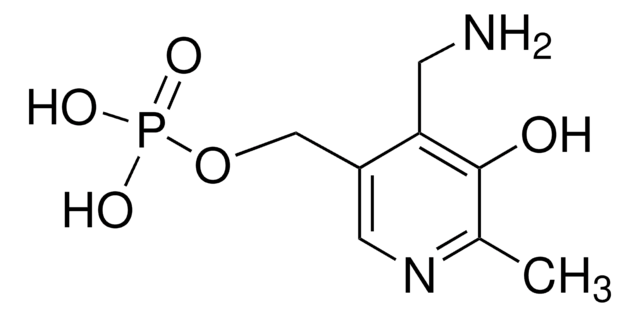P9255
Pyridoxal 5′-phosphate hydrate
≥98%
Synonym(s):
Pyridoxal phosphate, 3-Hydroxy-2-methyl-5-([phosphonooxy]methyl)-4-pyridinecarboxaldehyde, Codecarboxylase, PLP, Pyridoxal 5-phosphate
About This Item
Recommended Products
biological source
synthetic (organic)
Quality Level
Assay
≥98%
form
powder
technique(s)
HPLC: suitable
color
beige
off-white to yellow
mp
140-143 °C
storage temp.
−20°C
SMILES string
CC1=NC=C(COP(O)(O)=O)C(C([H])=O)=C1O
InChI
1S/C8H10NO6P/c1-5-8(11)7(3-10)6(2-9-5)4-15-16(12,13)14/h2-3,11H,4H2,1H3,(H2,12,13,14)
InChI key
NGVDGCNFYWLIFO-UHFFFAOYSA-N
Looking for similar products? Visit Product Comparison Guide
General description
Application
- as a reference standard to quantify vitamin B6 in feed and digesta samples using high performance liquid chromatography (HPLC)
- in D-amino acid transaminase reaction(10)
- as a cofactor for L-glutamic acid decarboxylase
Biochem/physiol Actions
Storage Class Code
11 - Combustible Solids
WGK
WGK 3
Flash Point(F)
Not applicable
Flash Point(C)
Not applicable
Personal Protective Equipment
Certificates of Analysis (COA)
Search for Certificates of Analysis (COA) by entering the products Lot/Batch Number. Lot and Batch Numbers can be found on a product’s label following the words ‘Lot’ or ‘Batch’.
Already Own This Product?
Find documentation for the products that you have recently purchased in the Document Library.
Customers Also Viewed
Articles
Serotonin is stored in cells and metabolized by MAO, influencing CNS, GI, and platelet functions.
Serotonin is stored in cells and metabolized by MAO, influencing CNS, GI, and platelet functions.
Serotonin is stored in cells and metabolized by MAO, influencing CNS, GI, and platelet functions.
Serotonin is stored in cells and metabolized by MAO, influencing CNS, GI, and platelet functions.
Our team of scientists has experience in all areas of research including Life Science, Material Science, Chemical Synthesis, Chromatography, Analytical and many others.
Contact Technical Service








